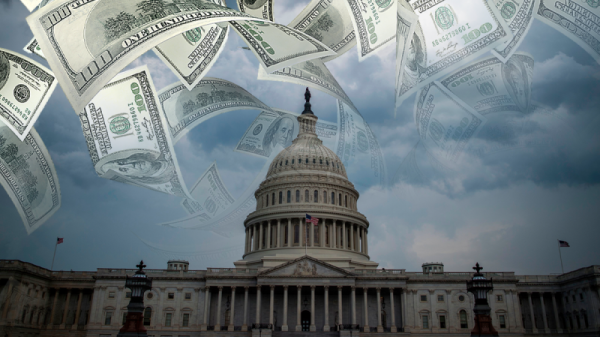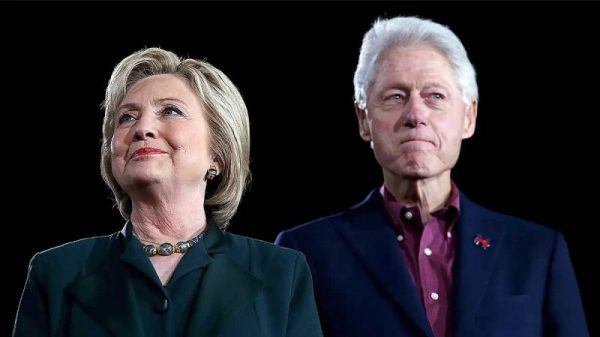A new Washington Post-University of Maryland poll affirms that the Jan. 6 revisionism of Donald Trump and the political right has had an impact three years hence, by adjusting views in a more sympathetic direction to Trump and those who stormed the Capitol.
But what the poll also shows is that most Americans have not bought into that revised version of events. And the events remain a distinct political liability for Trump heading into 2024 — the kind of liability that could still damage Trump once voters are reacquainted with the particulars.
The top line is that voters on the right have increasingly agreed with the idea that Jan. 6 participants and Trump’s actions weren’t so egregious. Compared to the same poll two years ago, Republicans are less likely to believe that those who stormed the Capitol were “mostly violent” and that Trump bears responsibility for the events (similar to other polls that have tested views over time). They’re now even more likely to say that President Biden’s win was illegitimate. They’re also more likely to believe that legal punishments for participants are “too harsh.”
But that last one is a good encapsulation of how limited the revisionism’s reach has been.
While Trump has made pardoning Jan. 6 participants a key 2024 plank, only 42 percent of Republicans buy into the idea that their legal punishments have been too harsh. A majority of the GOP says the punishments have been either “fair” (37 percent) or “not harsh enough” (17 percent).
Similarly, just 35 percent of Republicans say that those who entered the Capitol that day were “mostly peaceful” — despite the efforts of the likes of Tucker Carlson to make that case. (A plurality of Republicans say that participants were “equally peaceful and violent.”)
Other data also shows that while the choir on the political right has grown, Trump is still largely preaching to the choir:
Fifty-three percent overall say Trump bears at least a “good amount” of culpability for the attack on the Capitol.Fifty-six percent say Trump is at least “probably” guilty of a crime by lying “about voter fraud in an illegal effort to overturn the 2020 election.” Just 33 percent lean toward viewing him as innocent, including just 21 percent who say he’s “definitely innocent.” (A minority of Republicans — 44 percent — say he’s “definitely innocent.”)While Trump has claimed his Jan. 6 indictments are politically motivated, Americans reject that claim 57 percent (“holding Trump accountable under the law like anyone else”) to 41 percent (“unfairly targeting Trump for political reasons”).About 6 in 10 say Trump’s Jan. 6 actions at least “cast doubts on his fitness” for the presidency.Fifty-eight percent overall say those who entered the Capitol “threatened democracy,” while just 12 percent said they “defended democracy.” This despite Trump likening the participants to patriots and citing “J6 hostages, not prisoners.” (Republicans also lean slightly more toward the idea that those who entered the Capitol threatened democracy.)
In total, the picture is of a revisionism effort that has worked, but largely just with people who were predisposed to believe its messengers. And Jan. 6 and Trump’s effort to overturn the 2020 election are something that clear and consistent majorities of the American public — and electorate — still regard as being a stain on our nation’s history. That includes smaller but significant numbers of Republicans.
The narrative since Trump’s indictments has often been that they helped him. But while that’s apparently true when it comes to the prospect of winning the GOP nomination, it’s less evident that it’s the case with the general election. Indeed, Trump’s polling in the general has improved, but that could just as easily owe to Biden’s declining political stock and fading memories of events like Jan. 6.
Those memories won’t remain as faded. Trump could face one or possibly even two criminal trials focused on his Jan. 6-related actions before Election Day 2024. And 56 percent of Americans lean toward his being guilty — with a minority of his own base convinced he’s innocent. Trump, meanwhile, has pressed forward with a version of events that majorities of Americans continue to reject.
Those views rejecting Trump’s version of events could also gain more political currency as we approach another election in which Trump has increasingly signaled he’ll likely reject the results. The new poll shows 71 percent of Americans say they’re not confident Trump will accept the 2024 results if he loses — at which point the many people who viewed what happened after the 2020 election as being very bad could be made to fear some kind of repeat.
A new Washington Post-University of Maryland poll affirms that the Jan. 6 revisionism of Donald Trump and the political right has had an impact three years hence, by adjusting views in a more sympathetic direction to Trump and those who stormed the Capitol.
But what the poll also shows is that most Americans have not bought into that revised version of events. And the events remain a distinct political liability for Trump heading into 2024 — the kind of liability that could still damage Trump once voters are reacquainted with the particulars.
The top line is that voters on the right have increasingly agreed with the idea that Jan. 6 participants and Trump’s actions weren’t so egregious. Compared to the same poll two years ago, Republicans are less likely to believe that those who stormed the Capitol were “mostly violent” and that Trump bears responsibility for the events (similar to other polls that have tested views over time). They’re now even more likely to say that President Biden’s win was illegitimate. They’re also more likely to believe that legal punishments for participants are “too harsh.”
But that last one is a good encapsulation of how limited the revisionism’s reach has been.
While Trump has made pardoning Jan. 6 participants a key 2024 plank, only 42 percent of Republicans buy into the idea that their legal punishments have been too harsh. A majority of the GOP says the punishments have been either “fair” (37 percent) or “not harsh enough” (17 percent).
Similarly, just 35 percent of Republicans say that those who entered the Capitol that day were “mostly peaceful” — despite the efforts of the likes of Tucker Carlson to make that case. (A plurality of Republicans say that participants were “equally peaceful and violent.”)
Other data also shows that while the choir on the political right has grown, Trump is still largely preaching to the choir:
Fifty-three percent overall say Trump bears at least a “good amount” of culpability for the attack on the Capitol.Fifty-six percent say Trump is at least “probably” guilty of a crime by lying “about voter fraud in an illegal effort to overturn the 2020 election.” Just 33 percent lean toward viewing him as innocent, including just 21 percent who say he’s “definitely innocent.” (A minority of Republicans — 44 percent — say he’s “definitely innocent.”)While Trump has claimed his Jan. 6 indictments are politically motivated, Americans reject that claim 57 percent (“holding Trump accountable under the law like anyone else”) to 41 percent (“unfairly targeting Trump for political reasons”).About 6 in 10 say Trump’s Jan. 6 actions at least “cast doubts on his fitness” for the presidency.Fifty-eight percent overall say those who entered the Capitol “threatened democracy,” while just 12 percent said they “defended democracy.” This despite Trump likening the participants to patriots and citing “J6 hostages, not prisoners.” (Republicans also lean slightly more toward the idea that those who entered the Capitol threatened democracy.)
In total, the picture is of a revisionism effort that has worked, but largely just with people who were predisposed to believe its messengers. And Jan. 6 and Trump’s effort to overturn the 2020 election are something that clear and consistent majorities of the American public — and electorate — still regard as being a stain on our nation’s history. That includes smaller but significant numbers of Republicans.
The narrative since Trump’s indictments has often been that they helped him. But while that’s apparently true when it comes to the prospect of winning the GOP nomination, it’s less evident that it’s the case with the general election. Indeed, Trump’s polling in the general has improved, but that could just as easily owe to Biden’s declining political stock and fading memories of events like Jan. 6.
Those memories won’t remain as faded. Trump could face one or possibly even two criminal trials focused on his Jan. 6-related actions before Election Day 2024. And 56 percent of Americans lean toward his being guilty — with a minority of his own base convinced he’s innocent. Trump, meanwhile, has pressed forward with a version of events that majorities of Americans continue to reject.
Those views rejecting Trump’s version of events could also gain more political currency as we approach another election in which Trump has increasingly signaled he’ll likely reject the results. The new poll shows 71 percent of Americans say they’re not confident Trump will accept the 2024 results if he loses — at which point the many people who viewed what happened after the 2020 election as being very bad could be made to fear some kind of repeat.





















